Reza Zarrab: Gold trader's US legal saga grips Turkey
- Published
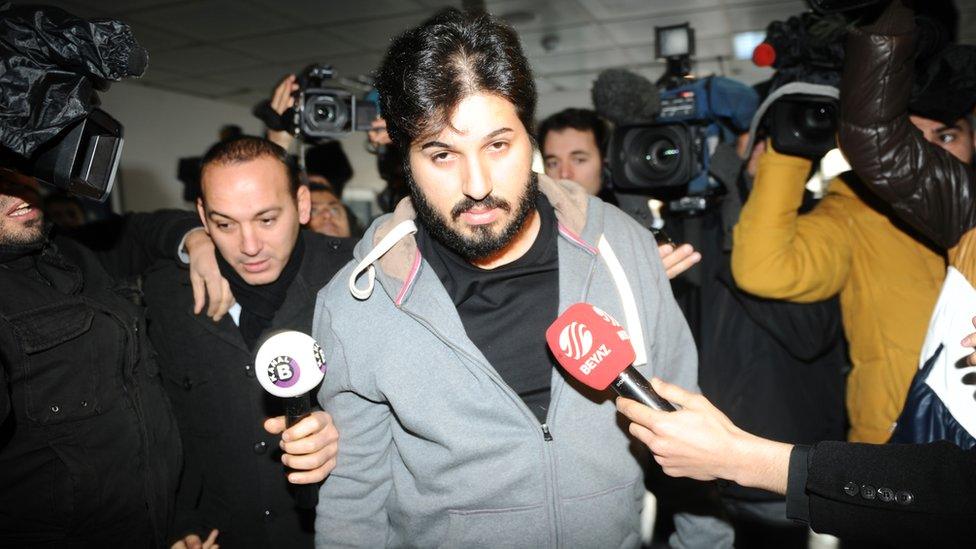
The case of gold trader Reza Zarrab is being closely watched in Turkey
He was leading a lavish life, with two villas on the shores of the Bosphorus worth around $40m (£30m) and gifts of million-dollar paintings for his pop-star wife.
His holdings were said to include a private jet, around 20 properties, as well as luxurious cars and boats.
He was often seen posing for cameras with figures such as President Recep Tayyip Erdogan's wife Emine, to whose charity he is alleged to have donated over $4m.
But Iranian-Turkish gold trader Reza Zarrab, 34, is no ordinary tycoon.
He was arrested in Miami in March 2016 for allegedly conspiring to evade US sanctions against Iran, engaging in hundreds of millions of dollars worth of transactions on behalf of the government of Tehran, money-laundering and bank fraud, and faces up to 95 years in prison.
On Tuesday, it emerged Mr Zarrab had pleaded guilty and was now the US government's star witness. He is set to testify against Turkish banker Mehmet Hakan Atilla on a series of international corruption allegations that reached the highest levels of the Turkish government.
'$500,000 in a chocolate box'
It all started tumbling down for Mr Zarrab in 2013 when he was detained by Turkish authorities in a wide-ranging corruption investigation, along with the sons of two cabinet ministers.
Prosecutors accused Mr Zarrab of involvement in facilitating Iranian money transfers via gold-smuggling, setting up bogus companies to buy oil and gas from Iran in exchange for gold and bribing senior ministers to cover it up.
The alleged "gifts" were said to include a $350,000 watch, a $37,000 piano and millions of dollars in cash - some of which was reportedly transferred in shoeboxes to politicians or bureaucrats involved in the scheme.
In one incident, a Turkish government minister is claimed to have received $500,000 in cash from Mr Zarrab, which was delivered in a chocolate box, along with a silver plate.
The allegations erupted when audio recordings of conversations between Mr Zarrab and several politicians were leaked online.
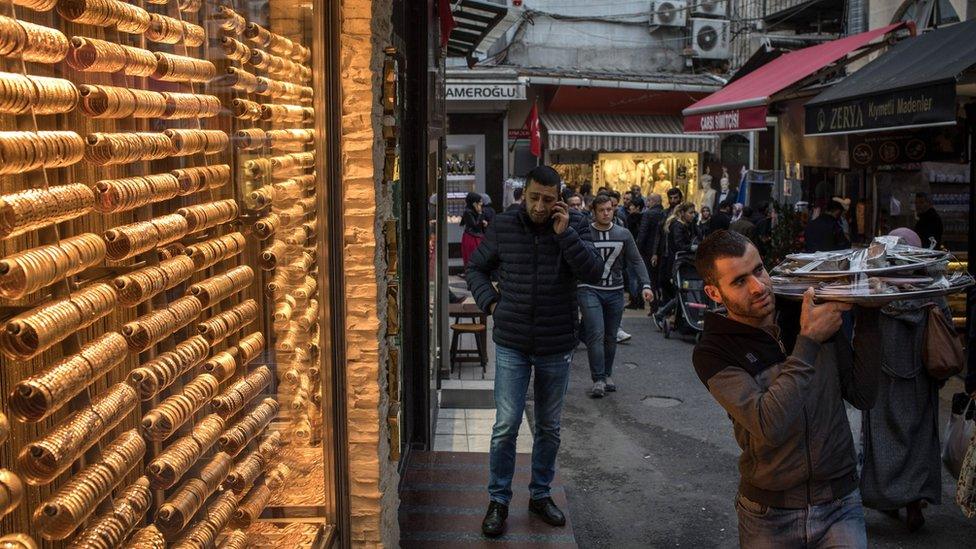
Mr Zarrab was accused in Turkey of facilitating Iranian money transfers via gold smuggling
Mr Zarrab denied all the bribery accusations at the time and claimed his trading business worked within the law.
Three cabinet ministers resigned as their sons were implicated in these recordings, and a fourth was dismissed from his post.
President Erdogan, who was then the prime minister, claimed the recordings were manipulated, condemned the investigation and called it "a judicial coup" orchestrated by the Islamist cleric Fethullah Gulen, a former ally of his government, who is currently in self-imposed exile in the US.
Soon the prosecutors were removed from the case, police investigators were reassigned and the inquiry was dropped.
Mr Zarrab was released after 70 days in detention, and was now being described by Mr Erdogan as a philanthropist who had made huge contributions to Turkish society.
Mr Zarrab would boast in a later interview that he had helped reduce Turkey's current account deficit and received an award in a ceremony attended by President Erdogan.
Disney trip gone wrong
But the Zarrab saga took another turn when he decided to go to Disney World with his wife and daughter in March 2016.
It is still not clear why Mr Zarrab went to the US. Some speculate that he must have known he could have been detained but took the risk anyway, since he feared his life would be at stake if he stayed in Turkey; others that he wanted to avoid possible extradition to Iran.
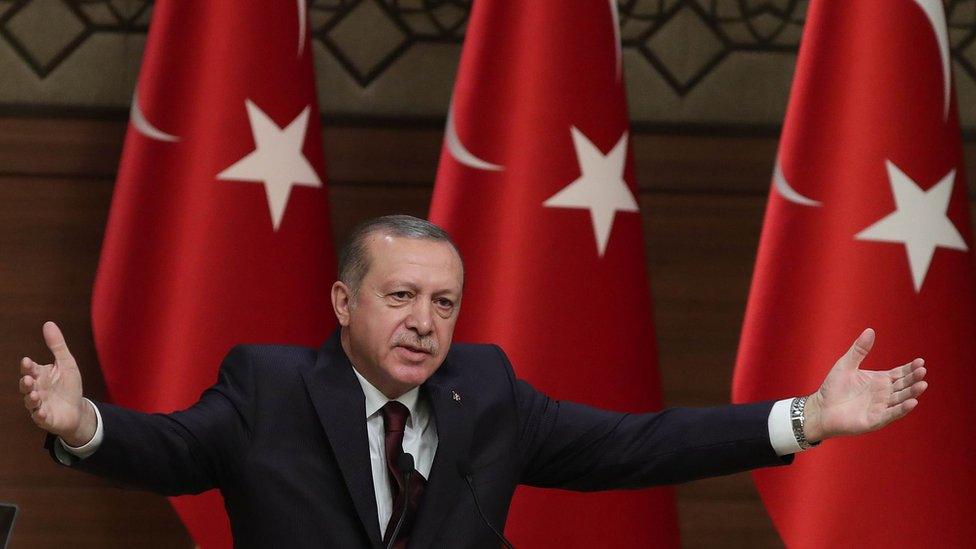
Mr Erdogan has criticised Mr Zarrab's trial in the US
In November, speculation grew as to the whereabouts of Mr Zarrab, as US media reports suggested he had been removed from a federal prison and was now co-operating with prosecutors to strike a plea bargain.
An NBC report also suggested that special counsel Robert Mueller was investigating whether the Turkish government had offered former US National Security Advisor Michael Flynn a sum of over $15m to ensure that Mr Zarrab's case was dropped, and to work towards the abduction of Fethullah Gulen, whom the government claims masterminded the 2016 failed coup plot in Turkey.
These allegations were denied by Mr Flynn's lawyers. However earlier this year, Mr Flynn acknowledged he worked as a foreign agent representing the interests of the Turkish government, having been paid more than $500,000 to this end.
When Mr Zarrab was first arrested in the US, President Erdogan said this case was of no interest to Turkey.
But since then he has allegedly lobbied for Mr Zarrab's release in talks in the US, called the prosecutors "secret agents of Fethullah Gulen" and described the investigation as a plot against Turkey.
Turkish authorities have also opened an investigation into the US prosecutors behind the case, claiming that the alleged evidence was based on fabricated documents.
Many in Turkey believe the government fears Mr Zarrab's testimony in a Manhattan court could bring further embarrassment to top officials in Ankara.
Will Mr Zarrab appear before the court? Will he testify against Turkish officials? Will he confirm the alleged bank frauds? Will his testimony lead to further indictments on others? What will come out at the trial? How damaging will that be for future US-Turkey relations?
Turkey holds its breath.
- Published24 March
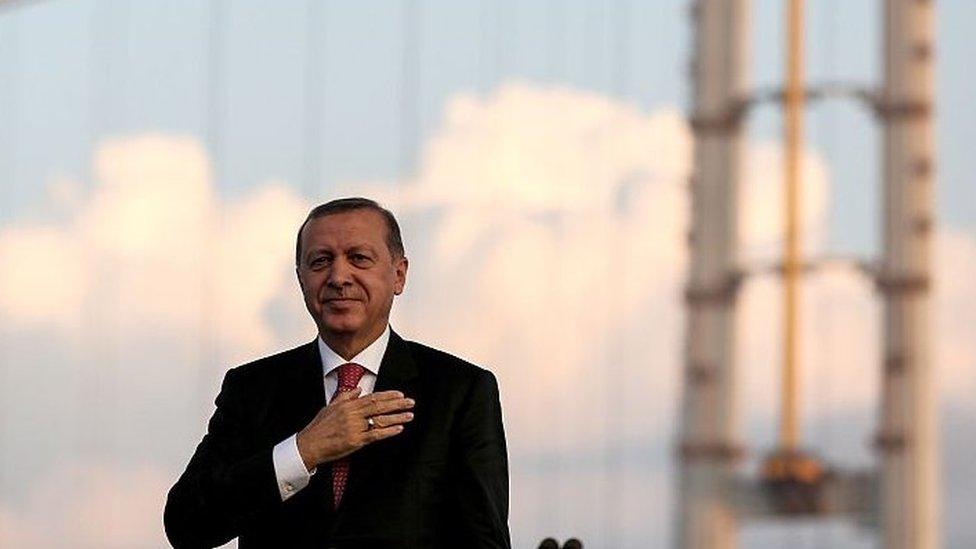
- Published27 January 2014
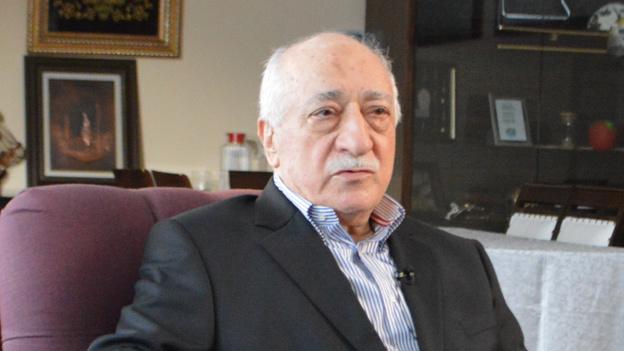
- Published22 August 2023
